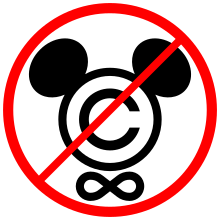While a controversy over the Stop Online Piracy Act is going on and the copyright laws are defined and more controlled not by the government but by private companies in the U.S.(Mazzone), a similar thing also happens in Japan. In the negotiation of the Trans-Pacific Partnership (TPP) between ten countries, the U.S. Government tries to strongly push its copyright policy on the other countries based on its national interests. Japanese Government recently announced to join the TPP although there is strong opposition by the public for a fear that domestic industries such as medical services and agriculture would be wiped out by foreign companies and investors. Coincidentally, the copies of U.S. TPP proposal were leaked to media (Chirgwin). Here is a part of the intellectual property chapter of the list:
Copyright
- Copyright damages shall consider the suggested retail price or other legitimate measure of value submitted by the right holder.
- (art. 4.5) The term of protection of a work (including a photographic work), performance, or phonogram is to be calculated:
- on the basis of the life of a natural person, the term shall not be less than the life of the author and 70 years after the author’s death;
- on a basis other than the life of a natural person, the term shall be: (i) not less than 95 years from the end of the calendar year of the first authorized publication of the work, performance, or phonogram, or (ii) failing such authorized publication within 25 years from the creation of the work, performance, or phonogram, not less than 120 years from the end of the calendar year of the creation of the work, performance, or phonogram.
- Would eliminate any possibility of parallel trade in copyrighted books, journals, sheet music, sound recordings,
computer programs, and audio and visual works (i.e., categories of products in which the value of the copyrighted
material represents substantially all of the value of the product) (art. 4.2, and footnote 11) - Each Party shall establish or maintain a system that provides for pre-established damages, which shall be available upon the election of the right holder
- Requires criminal enforcement for technological measures beyond WIPO Internet Treaties, even when there is not copyright infringement (art. 5.9)
- Impose a legal regime of ISP liability beyond the DMCA standards (art. 16.3)
- Requires legal incentives for service providers to cooperate with copyright owners in deterring the unauthorized storage and transmission of copyrighted materials; (art. 16.3.b.vi.A)
- Requires identifying internet users for any ISP, going beyond U.S. case law (art. 16.3.b.xi)
- Includes the text of the controversial US/KOREA side letter on shutting down web sites
(KEI, US government draft of the intellectual property chapter of the Trans-Pacific Partnership Agreement - 2011)
 |
| Click here to Wikipedia |
The agreements above are to make a copyright law uniform across all the signatory countries, but so far it's only beneficial for the U.S. In 2010, the U.S. earned $134 billion in international sales and exports that were related to the intellectual property (AAP), whereas Japan ended up with a deficit of $6.4 billion. These agreements include stricter protections than the WTO's Agreement on Trade-Related Aspects of Intellectual Property Rights (Pharma Japan).
To examine more in detail, there are two main differences between the present copyright law of Japan and that of the U.S. One of them is that under the current law in Japan, the police cannot act against copyright infringement unless the copyright holders file a formal complaint, whereas such complaint is not required at all for prosecution in the U.S. If the present U.S. law were applied to Japan, the police would have the discretion on what to prosecute (Yaraon!). (As a result, some manga and anime for adults would be probably targeted first). The other different point is that unlike the U.S., there is no "fair use" provision in Japan's copyright law (There are a limitation and exception to the exclusive right which is similar to the U.S.'s fair use provision, but the idea is completely different). This "fair use" provision may help fan creation in Japan from being punished, but this is the one that the U.S. Government would never export to other countries since the provision would conflict with the national interests of the U.S.
Copyright has been argued more often than ever before as digital copies become more available among people in this Internet era. It may be the time for us to think about copyright again. In an article, a sci-tech writer David Bradley introduces the fact that classical composers such as Vivaldi and Beethoven composed much more music pieces than the contemporary composers in the 20th century do and says, "... copyright laws, while protecting vested interests, have simply stifled creativity" (Bradley). To begin with, we Japanese at least have to decide what position Japan should stand on with regard to TPP negotiations regarding intellectual property.

0 件のコメント:
コメントを投稿